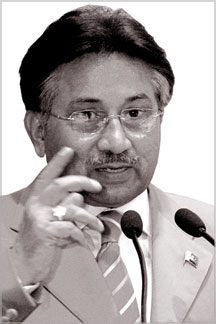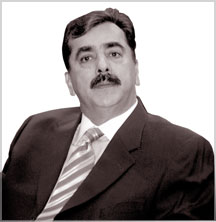Pakistan rethinks US policy on militants
By Barbara Plett
There is a buzz of excitement in the wood-panelled assembly hall of
Pakistan's parliament.
After eight years of military rule, the new legislators feel
empowered by an enormous popular mandate.
And they are ready to tackle unpopular policies, especially
Pakistan's participation in what is called the War on Terror.
|

Pakistani President Pervez Musharraf |
"We've gone through enough problems because of following different
agendas of different countries - we need to follow our own agenda," said
one parliamentarian from the governing coalition, speaking to a crush of
reporters outside.
"Pakistan must get out of America's fatal embrace," said another.
Out of the loop
Comments like these alarm the Americans, because Pakistan is crucial
to their Afghan policy.
Since 9/11 they have relied on President Pervez Musharraf and the
army for cooperation against al-Qaeda and the Taleban, in exchange for
billions of dollars.
Until now parliament was out of the loop. "No one in this country
knows what General Musharraf has agreed with the Americans or anyone
else!" says Ahsan Iqbal, a minister in the new cabinet. The president
apparently agreed to an increase in US air strikes in the Taleban
strongholds near the Afghan border.
These have killed around 50 people this year, including militants.
Like everyone else, Mr Iqbal read about the tacit understanding in
the newspaper.
Security
Such heavy handed tactics "give a cause for these militants to fight
for", he says, "so therefore I think whatever strategy we work out, the
sovereignty of Pakistan must be respected and we should not give more
fuel to these militants".
Pakistanis believe a deadly bombing campaign in the country is the
price they are paying for missile strikes and large scale army
operations against the militants.
|

Prime Minister Yusuf Raza Gillani |
Nearly a thousand people were killed in suicide attacks last year.
And massive injections of American aid have made little difference to
their security. "The general perception in Pakistan is that the deal
over the War on Terror was favourable only to one party and unfavourable
to Pakistan," says Aseff Ahmad Ali, a member of the governing Pakistan
Peoples' Party and a former foreign minister.
"The Americans give us a billion dollars a year for the War on
Terror. But where has the money gone? We don't know, maybe to the army.
"But we do know there's been no trickle-down effect - there is
neither internal (security) nor food security nor development.
"To the common man the US-Pakistan deal looks absolutely awful. It
has to be renegotiated."
In a speech outlining the government's policies, Prime Minister Yusuf
Raza Gillani emphasized social and political reforms to address the
causes of militancy.
He also said the government would negotiate with those who laid down
their arms. Some of his coalition partners go further, like the Pashtun
Awami National Party (ANP), which has gained power in the North West
Frontier Province near the Afghan border.
"This problem is not going to be solved by my going to talk to the
tribal elders only," the provincial chief minister, Amir Haider Khan
Hoti, told the Dawn newspaper. "Unless we somehow approach the one who
has taken up arms, or is involved in suicide bombing or has gone to the
other extreme, and reach an understanding with him, the problem would
not be solved."
'Clear and present danger'
This is a long term solution, but does America have the patience to
wait? The head of its Central Intelligence Agency is sounding very
impatient.
"The situation on the Afghanistan-Pakistan border presents a clear
and present danger to... the West in general and the United States in
particular," Michael Hayden said during a recent interview on NBC
television.
"It's very clear to us that al-Qaeda has been able for the past 18
months or so to establish a safe haven along the border area that they
have not enjoyed before.
"Operationally, we are turning every effort to capture or kill that
leadership from the top to the bottom."
Tanvir Ahmed Khan, a former Pakistani ambassador to Afghanistan
argues that "the Americans have leverage (in Pakistan), but not the same
degree as before".
"There would be a restive parliament. There is no strong opinion in
parliament for reversing the policy, but there is a strong opinion for
moderating it, for a better mix between military and diplomatic
measures."
Military wary
But will Pakistan's powerful army agree?
President Musharraf's attempts at peace deals only strengthened the
militants and put the military on the back-foot, says retired General
Shujaat Ali Khan. The military would be wary of going down the same path
again.
"There may be an (initial) agreement on the part of the militants, to
sort of pull back their punches", he says, "but during this two or three
month period there is a danger that they may regroup. "And if the armed
force is withdrawn, there may be a resurgence, and they'll strike
again."
Many here also believe that peace inside Pakistan will be difficult,
as long as American and Nato troops remain in Afghanistan.
On Sunday the Pakistan Taleban Movement (Tehreek-e-Taliban Pakistan)
responded to the government's overtures.
It said it was ready to end attacks inside Pakistan if the
authorities showed flexibility, but the 'jihad' against America would
continue in Afghanistan.
"Our war is with America", local Taleban leader Maulvi Faqir Muhammed
told a rally. "Whenever Pakistan will work for American interests as its
ally, we will oppose it."
-BBC |
